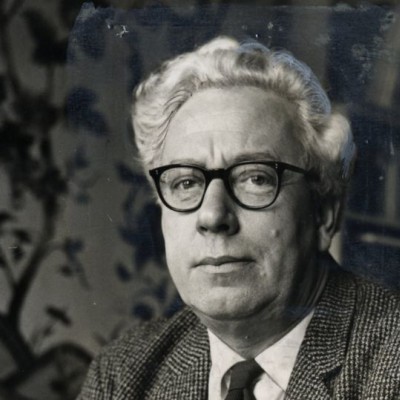Daniel Jones
Daniel Jones is one of the most important Welsh post-war composers. He left a large body of works in virtually all spheres of creative activity – thirteen symphonies; eight string quartets; a large body of chamber music; incidental music; opera (The Knife and Orestes); several cantatas; and concertos, the three most notable of these being for Cello, Oboe, and Violin.
Born in Swansea, he was at first encouraged to study English literature in Swansea University where he graduated with first class honours, later taking his MA for the study of Elizabethan Lyric. His boyhood friend, Dylan Thomas, became the internationally known poet and their relationship is colourfully captured in Jones’s memoir My Friend Dylan Thomas (1977). Jones composed the award-winning music for Under Milk Wood and would later edit Thomas’s poems including several examples of the poet’s early work. Their word games as boyhood friends no doubt inspired both their work.
Following on from his studies in Swansea, Jones studied conducting in the Royal Academy of Music – these were the first years of professional performances of his early chamber music in particular. During the war, Jones famously worked in Bletchley Park as a Captain in the Russian-Japanese section (he was a gifted multi linguist). This interest in complexity stemmed from childhood and resulted in his formulating a concept of what he called’ complex metres’. After the war, he eventually returned to Swansea where the bulk of his mature work was composed.
His First Symphony was a watershed in Welsh music when it was performed at the Swansea Festival. There followed another twelve symphonies, together with eight String Quartets, which are surely one of the most distinguished series in post-war British music. His output is of the British symphonic sonata-allegro principle, coupled with rhythmic ingenuity and experimentation, and a harmonic language based on rather than in tonality.
Daniel Jones is one of the most important Welsh post-war composers. He left a large body of works in virtually all spheres of creative activity – thirteen symphonies; eight string quartets; a large body of chamber music; incidental music; opera (The Knife and Orestes); several cantatas; and concertos, the three most notable of these being for Cello, Oboe, and Violin.
Born in Swansea, he was at first encouraged to study English literature in Swansea University where he graduated with first class honours, later taking his MA for the study of Elizabethan Lyric. His boyhood friend, Dylan Thomas, became the internationally known poet and their relationship is colourfully captured in Jones’s memoir My Friend Dylan Thomas (1977). Jones composed the award-winning music for Under Milk Wood and would later edit Thomas’s poems including several examples of the poet’s early work. Their word games as boyhood friends no doubt inspired both their work.
Following on from his studies in Swansea, Jones studied conducting in the Royal Academy of Music – these were the first years of professional performances of his early chamber music in particular. During the war, Jones famously worked in Bletchley Park as a Captain in the Russian-Japanese section (he was a gifted multi linguist). This interest in complexity stemmed from childhood and resulted in his formulating a concept of what he called’ complex metres’. After the war, he eventually returned to Swansea where the bulk of his mature work was composed.
His First Symphony was a watershed in Welsh music when it was performed at the Swansea Festival. There followed another twelve symphonies, together with eight String Quartets, which are surely one of the most distinguished series in post-war British music. His output is of the British symphonic sonata-allegro principle, coupled with rhythmic ingenuity and experimentation, and a harmonic language based on rather than in tonality.
Compilations with this composer
CompilationsRelated composers
Related composersExternal Links
Music Map
Discover more about the classical music of today with NMC's Music Map, and exciting and educational online tool which enables you to see and hear the connections between composers, their teachers, pupils, influences and their works.
Music Map

